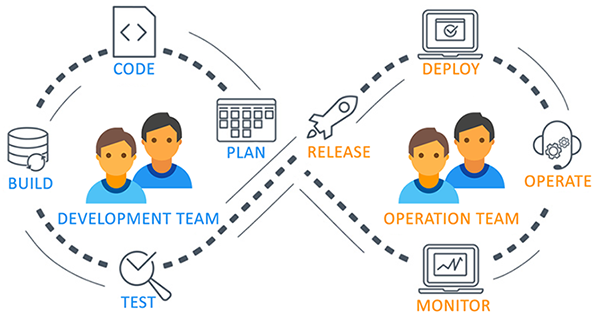In the world of software development, the demand for agility, efficiency, and continuous improvement has led to the rise of DevOps. DevOps, a combination of "development" and "operations," is an approach that brings together the principles of software development and IT operations to enable organizations to deliver high-quality software at a faster pace.
Traditionally, software development and IT operations have been treated as separate entities within an organization. Development teams focus on writing code and introducing new features, while operations teams handle infrastructure management, deployment, and maintenance. This siloed approach often resulted in communication gaps, slow delivery cycles, and a lack of collaboration between these two critical areas.
DevOps aims to bridge this gap by fostering a culture of collaboration, automation, and continuous integration and delivery. It breaks down the barriers between development and operations teams, encouraging them to work together throughout the software development lifecycle.
One of the key principles of DevOps is automation. By automating manual and repetitive tasks, such as building, testing, and deploying software, organizations can significantly reduce human error, improve efficiency, and accelerate the delivery process.
Continuous integration and continuous delivery (CI/CD) pipelines are at the core of DevOps automation, enabling frequent code integration, automated testing, and rapid deployment of software changes.
Another essential aspect of DevOps is the emphasis on monitoring and feedback. With DevOps, teams continuously monitor the performance and health of their applications in real-time, using various tools and techniques. This allows them to identify issues proactively, make data-driven decisions, and quickly respond to any problems that arise.
Collaboration and communication are fundamental to the success of DevOps. Development and operations teams, along with other stakeholders like quality assurance, security, and product management, work closely together, breaking down the traditional barriers between them. By fostering a culture of shared responsibility, knowledge sharing, and cross-functional teams, organizations can enhance collaboration and accelerate the delivery of value to their customers.
The benefits of implementing DevOps practices are numerous. Organizations that embrace DevOps often experience shorter development cycles, faster time to market, increased agility, and improved product quality. By enabling frequent releases and rapid feedback loops, DevOps allows teams to iterate on their software, address customer needs more effectively, and stay ahead of the competition in today's fast-paced digital landscape.
However, adopting DevOps requires more than just implementing tools and processes. It requires a cultural shift within the organization. DevOps encourages a mindset of continuous learning, experimentation, and embracing failure as an opportunity for improvement. It promotes a blameless culture where individuals are encouraged to take ownership and collaborate to solve problems collectively.
In conclusion, DevOps is a transformative approach that brings development and operations together to deliver software more efficiently, reliably, and rapidly. By embracing automation, fostering collaboration, and emphasizing continuous improvement, organizations can unlock the full potential of DevOps and achieve greater business outcomes in the ever-evolving world of software development.




Top comments (0)